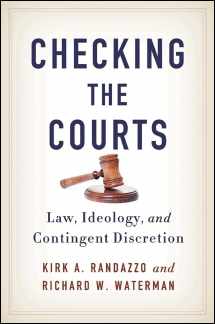
Checking the Courts: Law, Ideology, and Contingent Discretion (SUNY series in American Constitutionalism)
ISBN-13:
9781438452883
ISBN-10:
1438452888
Edition:
Reprint
Author:
Kirk A. Randazzo, Richard W. Waterman
Publication date:
2015
Publisher:
State University of New York Press
Format:
Paperback
216 pages
FREE US shipping
Rent
35 days
Due Jun 22, 2024
35 days
from $9.00
USD
Book details
ISBN-13:
9781438452883
ISBN-10:
1438452888
Edition:
Reprint
Author:
Kirk A. Randazzo, Richard W. Waterman
Publication date:
2015
Publisher:
State University of New York Press
Format:
Paperback
216 pages
Summary
Checking the Courts: Law, Ideology, and Contingent Discretion (SUNY series in American Constitutionalism) (ISBN-13: 9781438452883 and ISBN-10: 1438452888), written by authors
Kirk A. Randazzo, Richard W. Waterman, was published by State University of New York Press in 2015.
With an overall rating of 4.1 stars, it's a notable title among other
books. You can easily purchase or rent Checking the Courts: Law, Ideology, and Contingent Discretion (SUNY series in American Constitutionalism) (Paperback, Used) from BooksRun,
along with many other new and used
books
and textbooks.
And, if you're looking to sell your copy, our current buyback offer is $0.03.
Description
Examines and measures the extent to which statutory language affects judicial behavior.
How does the language of legislative statutes affect judicial behavior? Scholars of the judiciary have rarely studied this question despite statutes being, theoretically, the primary opportunity for legislatures to ensure that those individuals who interpret the law will follow their preferences. In Checking the Courts, Kirk A. Randazzo and Richard W. Waterman offer a model that integrates ideological and legal factors through an empirical measure of statutory discretion. The model is tested across multiple judicial institutions, at both the federal and state levels, and reveals that judges are influenced by the levels of discretion afforded in the legislative statutes. In those cases where lawmakers have clear policy preferences, legislation encourages judges to strictly interpret the plain meaning of the law. Conversely, if policy preferences are unclear, legislation leaves open the possibility that judges will make decisions based on their own ideological policy preferences. Checking the Courts thus provides us with a better understanding of the dynamic interplay between law and ideology.
How does the language of legislative statutes affect judicial behavior? Scholars of the judiciary have rarely studied this question despite statutes being, theoretically, the primary opportunity for legislatures to ensure that those individuals who interpret the law will follow their preferences. In Checking the Courts, Kirk A. Randazzo and Richard W. Waterman offer a model that integrates ideological and legal factors through an empirical measure of statutory discretion. The model is tested across multiple judicial institutions, at both the federal and state levels, and reveals that judges are influenced by the levels of discretion afforded in the legislative statutes. In those cases where lawmakers have clear policy preferences, legislation encourages judges to strictly interpret the plain meaning of the law. Conversely, if policy preferences are unclear, legislation leaves open the possibility that judges will make decisions based on their own ideological policy preferences. Checking the Courts thus provides us with a better understanding of the dynamic interplay between law and ideology.


We would LOVE it if you could help us and other readers by reviewing the book
Book review

Congratulations! We have received your book review.
{user}
{createdAt}
by {truncated_author}


